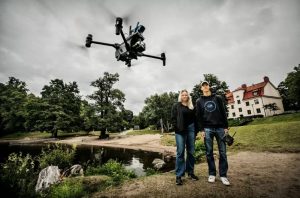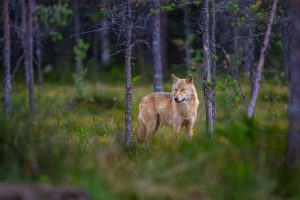Flox AB, a company from KTH Innovation will soon deliver autonomous drones and artificial intelligence that protect cultivated fields from wild animals and prevent the damages they cause. The company will create better conditions for landowners and prevent food loss.
Damages from wild animals represent a significant cost for farmers and landowners world-wide. The Federation of Swedish Farmers (LRF) estimates yearly damages at more than 2 billion SEK in Sweden alone, with 8 out of every 10 farmers affected. This leads to several associated costs, with decreased yield and increased labor being the most common. Consequently, the majority of farmers have a pessimistic outlook of the future – some even considering quitting their business as a result.
Looking into the future, sustainable food production is a pressing concern. By 2050, the agricultural consumption is estimated to have increased by 70% as the population grows. At the same time, the overall loss to agriculture in Europe from climate change is estimated to be at 18% by 2050.
But there is a light at the end of the tunnel. New technologies such as autonomous drones, robotics, and artificial intelligence give light to new innovative solutions to tackle the problems. Drones, also known as unmanned aerial vehicles (UAVs), have not yet made it into the mainstream agriculture space, but soon enough they will be helping agriculture professionals lead the way with sustainable farming practices, while also protecting and increasing profitability.
A new player in the industry is the Stockholm-based company Flox, which develops software with focus on repelling wild animals. The goal of the new company is to already in 2022 launch the fully autonomous service to farmers and landowners in Sweden. “We currently focus exclusively on technology to be applied in the agriculture sector. We are the very first company to repel large wild animals such as boars, deers and elks using this combination of the latest technology. Our system is also tested in other application areas where coexistence between humans and wild animals needs to be improved”, says Sara Nozkova, CEO and co-founder at Flox. “Damages caused by these animals are one of the main reasons for profit loss in the agricultural sector worldwide. We believe in a future where drones act as an extended hand of any landowner, performing tasks such as field protection but also data collection and crops health management”. For the past four years, the company’s co-founders Marco Moletta and Matteo Tadiello have specialized in applying robotics and artificial intelligence to path planning for autonomous UAVs and multiple agent coordinations at the Royal Institute of Technology, KTH. “We began getting interested in drones and realized we could solve the problem of wild animal damages with the technology that is available already today”, says Marco. “Our competitive edge lies in combining various technologies in one complex solution. We were able to build a complete autonomous service for both detection, deterrence, and data analysis.” After developing the first prototype in the KTH Innovation incubator, Marco and Matteo could establish that their technical solution worked and there was a high demand for the service among the Swedish farmers. In December 2020, the company Flox was founded with the aim to offer affordable tailor-made services provided by autonomous drones to protect fields from wild animals.
Flox AB was founded in December 2020. On March 1, Sara Nozkova took over the role of CEO of the company. Most recently, Sara comes from Kista Science City AB, where she works as Mobility Lead developing future sustainable urban mobility solutions. In June, Flox will conduct public demonstrations together with key stakeholders in the industry.
For more information, contact:
Sara Nozkova, CEO & Co-founder Flox




